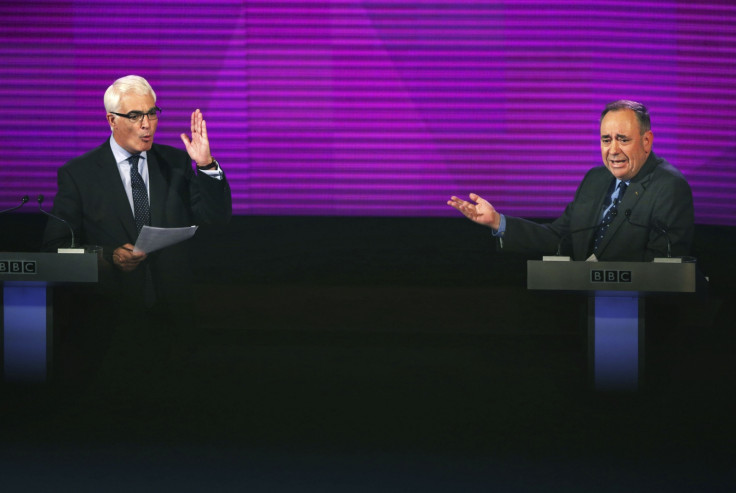Scottish Independence: Darling's Thrashing Proves Folly of Labour's Faustian Pact with Tories

How did it come to this for the former Labour Chancellor Alistair Darling? Dying a death in a crucial live TV debate, as he half-heartedly defended the consequences of Tory rule in Scotland, while offering only the occasional plaintive reminder that he isn't strictly speaking, a Tory himself?
The answer may seem obvious – Darling ended up in that position because he accepted the job as head of a cross-party anti-independence campaign that includes the Conservative party, which was a poisoned chalice that some unfortunate soul was going to have to grasp.
But in fact there was nothing inevitable about any of it. The former Labour First Minister, Henry McLeish, offered a very straightforward way out of the dilemma.
At the outset of the referendum campaign, Labour should have refused to have any formal ties with the Conservatives, and instead set up their own umbrella group, possibly including the Liberal Democrats and other non-Tory anti-independence organisations.
That body would still almost certainly have found itself designated by the Electoral Commission as the official No campaign, given Labour's relative strength in Scotland compared to the other London parties. Crucially, the group should then have devised an ambitious, detailed and credible proposal for vastly enhanced devolution.
Just imagine how differently last night's debate might have played out for Darling (or ideally a much more charismatic Labour figurehead) if he had gone in to bat for a No campaign that defined itself by its exclusion of the Tories, and by its genuine commitment to deliver more powers for Holyrood.
When an audience member asked the ultimate killer question – "if we are Better Together, why are we not Better Together already?" – Darling could have plausibly responded that the status quo was repugnant to him, and explained how he was going to ensure that Scotland would never again be governed by an unwanted Tory government.
Probably the one and only question that could still have skewered him under those circumstances was the Trident one, because even under the most advanced form of devolution there would be no Scottish veto on hosting weapons of mass destruction on our soil.
Instead, the chickens came home to roost in spectacular fashion for Labour's decision to embrace the Tories, and to set their face against real Home Rule.
Not even the most optimistic Yes campaigner could have written the script better. Darling floundered in excruciating fashion as he was at last put on the spot over the vagueness of the promises of more powers.
He failed to even come close to meeting Alex Salmond's challenge of naming three new job-creating powers that would be devolved in the event of a No vote. As far I could gather, he was inviting us to believe that "being part of the United Kingdom" is somehow a job-creating power for the Scottish Parliament.
Even more damagingly, Darling was seen to act as an apologist for NHS privatisation in England, for welfare cuts aimed at the disabled, and for policies that will increase child poverty.
There's a strong argument to be made that the biggest beneficiary of these gaffes was not Alex Salmond, or the SNP, or even the Green party, but rather the Labour for Independence group, which has just had their case made for them – namely that independence is now the only conceivable hope for a return to true Labour values.
After all, why is it that Labour rejected McLeish's advice, and failed to set up a non-Tory No campaign?
OK, the decision was probably partly driven by a pragmatic belief that they couldn't prevail without Tory money, and perhaps even by lingering memories of the catastrophic consequences of refusing to campaign alongside the SNP in the 1979 devolution referendum.
Incidentally, it's an entirely false comparison – the SNP would have been an enormous asset to a unified Yes campaign in 1979, while the limited on-the-ground resources of a virtual fringe party such as the modern Scottish Tories is scarcely worth having in exchange for the toxicity they bring with them.
But above all else, it was a decision that was borne out of conviction – Labour really do believe in the Westminster system as it stands.
They may not wholly relish the long spells of Conservative rule that unavoidably go with it, but if it's a choice between the "devil" of Scotland actually governing itself without the Tories, and the deep blue sea of ongoing Tory rule from Westminster, they'll take the deep blue sea every time.
Which is fair enough, but there's a heavy price to be paid for that belief system, because it simply isn't where the Scottish people are at. We may well look back at last night's debate as the moment when that extreme disconnect became firmly embedded in the public consciousness.
For decades, Labour have had to accept that if they self-indulgently place their own policy preferences over the centre-right instincts of Middle England, they lose elections – as simple as that.
But for the very first time, they're gradually starting to realise that different rules apply when they're dealing with a Scotland-only electorate, and that being too right-wing and London-centric can lose elections (and referendums) too. In a sense, that's exactly what independence is all about.
© Copyright IBTimes 2024. All rights reserved.







